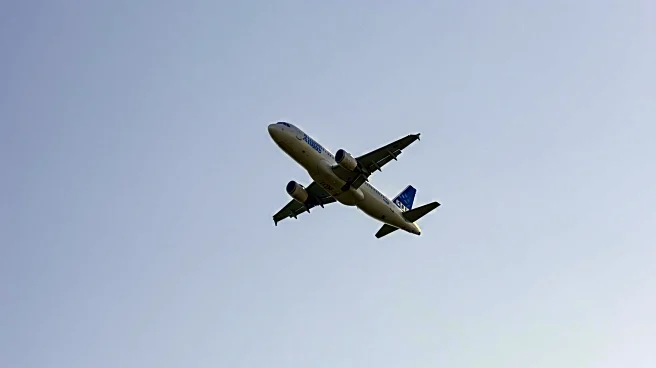What is the story about?
What's Happening?
The Airbus A320 family has overtaken the Boeing 737 in terms of narrowbody aircraft utilization, marking a significant shift in the aviation industry. The Boeing 737, which first flew in 1967, has been a market leader for decades. However, the A320 family, which debuted in 1987, has gradually increased its market share. As of 2025, the A320 family accounts for over 56% of combined commercial utilization, surpassing the Boeing 737. This change is attributed to higher delivery rates and lower retirement rates of the A320 fleet, which is younger compared to the 737. The Boeing 737 MAX, despite its recent challenges, still represents 22% of 737 utilization and nearly 10% of the combined 737/A320 utilization. The A320 family has a backlog of over 7,000 aircraft, while Boeing has nearly 5,000 737s in its backlog.
Why It's Important?
This shift in market dominance from Boeing to Airbus in the narrowbody sector has significant implications for the aviation industry. Airbus's increased market share reflects its ability to deliver newer, more efficient aircraft, which are favored by airlines for their operational cost benefits. The dominance of the A320 family could influence airline purchasing decisions, potentially affecting Boeing's market strategy and financial performance. Airlines may benefit from the increased availability and efficiency of the A320 family, impacting operational costs and fleet planning. This development also highlights the competitive dynamics between the two major aircraft manufacturers, influencing future innovations and market strategies.
What's Next?
Airbus is expected to maintain its lead in the narrowbody market due to its substantial backlog and continued high delivery rates. Boeing is working on certifying additional models of the 737 MAX, which could help regain some market share. Airlines will likely continue to evaluate their fleet compositions, balancing between the operational efficiencies offered by newer Airbus models and the established presence of Boeing aircraft. The competition between Airbus and Boeing will likely drive further advancements in aircraft technology and efficiency, benefiting airlines and passengers alike.
Beyond the Headlines
The shift in market dominance may also have broader implications for the aerospace supply chain, affecting suppliers and manufacturers associated with both Airbus and Boeing. The increased demand for Airbus aircraft could lead to shifts in employment and production strategies within the industry. Additionally, this change may influence regulatory and environmental considerations, as newer aircraft models typically offer better fuel efficiency and lower emissions, aligning with global sustainability goals.
















